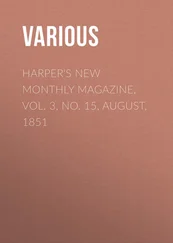Various - Harper's New Monthly Magazine, Vol. 3, July, 1851
Здесь есть возможность читать онлайн «Various - Harper's New Monthly Magazine, Vol. 3, July, 1851» — ознакомительный отрывок электронной книги совершенно бесплатно, а после прочтения отрывка купить полную версию. В некоторых случаях можно слушать аудио, скачать через торрент в формате fb2 и присутствует краткое содержание. Издательство: Иностранный паблик, Жанр: foreign_antique, periodic, foreign_edu, на английском языке. Описание произведения, (предисловие) а так же отзывы посетителей доступны на портале библиотеки ЛибКат.
- Название:Harper's New Monthly Magazine, Vol. 3, July, 1851
- Автор:
- Издательство:Иностранный паблик
- Жанр:
- Год:неизвестен
- ISBN:нет данных
- Рейтинг книги:3 / 5. Голосов: 1
-
Избранное:Добавить в избранное
- Отзывы:
-
Ваша оценка:
- 60
- 1
- 2
- 3
- 4
- 5
Harper's New Monthly Magazine, Vol. 3, July, 1851: краткое содержание, описание и аннотация
Предлагаем к чтению аннотацию, описание, краткое содержание или предисловие (зависит от того, что написал сам автор книги «Harper's New Monthly Magazine, Vol. 3, July, 1851»). Если вы не нашли необходимую информацию о книге — напишите в комментариях, мы постараемся отыскать её.
Harper's New Monthly Magazine, Vol. 3, July, 1851 — читать онлайн ознакомительный отрывок
Ниже представлен текст книги, разбитый по страницам. Система сохранения места последней прочитанной страницы, позволяет с удобством читать онлайн бесплатно книгу «Harper's New Monthly Magazine, Vol. 3, July, 1851», без необходимости каждый раз заново искать на чём Вы остановились. Поставьте закладку, и сможете в любой момент перейти на страницу, на которой закончили чтение.
Интервал:
Закладка:
From the "tops," and high up in the rigging, the movements in-shore could be descried, and frequently, when an officer came down to visit a comrade, I could hear of the progress of the siege, and learn, I need not say with what delight, that the Austrians had made little or no way in the reduction of the place, and that every stronghold and bastion was still held by Frenchmen.
At first, as I listened, the names of new places and new generals confused me; but by daily familiarity with the topic, I began to perceive that the Austrians had interposed a portion of their force between Massena's division and that of Suchet, cutting off the latter from Genoa, and compelling him to fall back toward Chivari and Borghetto, along the coast of the gulf. This was the first success of any importance obtained; and it was soon followed by others of equal significance. Soult being driven from ridge to ridge of the Apennines, till he was forced back within the second line of defenses.
The English officers were loud in condemning Austrian slowness; the inaptitude they exhibited to profit by a success, and the over-caution which made them, even in victory, so careful of their own safety. From what I overheard, it seemed plain that Genoa was untenable by any troops but French, or opposed to any other adversaries than their present ones.
The bad tidings—such I deemed them—came quicker and heavier. Now, Soult was driven from Monte Notte. Now, the great advance post of Monte Faccio was stormed and carried. Now, the double eagle was floating from San Tecla, a fort within cannon shot of Genoa. A vast semicircle of bivouac fires stretched from the Apennines to the sea, and their reflected glare from the sky lit up the battlements and ramparts of the city.
"Even yet, if Massena would make a dash at them," said a young English lieutenant, "the white-coats would fall back."
"My life on't he'd cut his way through, if he knew they were only two to one!"
And this sentiment met no dissentient. All agreed that French heroism was still equal to the overthrow of a force double its own.
It was evident that all hope of reinforcement from France was vain. Before they could have begun their march southward, the question must be decided one way or other.
"There's little doing to-night," said an officer, as he descended the ladder to the sick bay. "Melas is waiting for some heavy mortars that are coming up; and then there will be a long code of instructions from the Aulic Council, and a whole treatise on gunnery to be read, before he can use them. Trust me , if Massena knew his man, he'd be up and at him!"
Much discussion followed the speech, but all more or less agreed in its sentiment. Weak as were the French, lowered by fever and by famine, they were still an over-match for their adversaries. What a glorious avowal from the lips of an enemy was this! The words did more for my recovery than all the cares and skill of physic. Oh, if my countrymen but knew! if Massena could but hear it! was my next thought; and I turned my eyes to the ramparts, whose line was marked out by the bivouac fires, through the darkness. How short the distance seemed! and yet it was a whole world of separation. Had it been a great plain in a mountain tract, the attempt might almost have appeared practicable; at least, I had often seen fellows who would have tried it. Such were the ready roads, the royal paths to promotion; and he who trod them saved miles of weary journey. I fell asleep, still thinking on these things; but they haunted my dreams. A voice seemed ever to whisper in my ear—"If Massena but knew, he would attack them! One bold dash, and the Austrians would fall back." At one instant, I thought myself brought before a court-martial of English officers, for attempting to carry these tidings, and proudly avowing the endeavor, I fancied I was braving the accusation. At another, I was wandering through the streets of Genoa, gazing on the terrible scenes of famine I had heard of. And lastly, I was marching with a night party to attack the enemy. The stealthy foot-fall of the column appeared suddenly to cease; we were discovered; the Austrian cavalry were upon us! I started and awoke, and found myself in the dim, half-lighted chamber, with pain and suffering around me, and where, even in this midnight hour, the restless tortures of disease were yet wakeful.
"The silence is more oppressive to me than the roll of artillery," said one, a sick midshipman, to his comrade. "I grew accustomed to the clatter of the guns, and slept all the better for it."
"You'll scarcely hear much more of that music," replied his friend. "The French must capitulate to-morrow or next day."
"Not if Massena would make a dash at them," thought I; and with difficulty could I refrain from uttering the words aloud.
They continued to talk to each other in low whispers, and lulled by the drowsy tones I fell asleep once more, again to dream of my comrades and their fortunes. A heavy bang like a cannon-shot awoke me; but whether this were real or not I never knew; most probably, however, it was the mere creation of my brain, for all were now in deep slumber around me, and even the marine on duty had seated himself on the ladder, and with his musket between his legs, seemed dozing away peacefully. I looked out through the little window beside my berth. A light breeze was faintly rippling the dark water beneath me. It was the beginning of a "Levanter," and scarcely ruffled the surface as it swept along.
"Oh, if it would but bear the tidings I am full of!" thought I. But why not dare the attempt myself? While in America I had learned to become a good swimmer. Under Indian teaching, I had often passed hours in the water; and though now debilitated by long sickness, I felt that the cause would supply me with the strength I needed. From the instant that I conceived the thought, till I found myself descending the ship's side, was scarcely a minute. Stripping off my woolen shirt, and with nothing but my loose trowsers, I crept through the little window, and lowering myself gently by the rattlin of my hammock, descended slowly and noiselessly into the sea. I hung on thus for a couple of seconds, half fearing the attempt, and irresolute of purpose. Should strength fail, or even a cramp seize me, I must be lost, and none would ever know in what an enterprise I had perished. It would be set down as a mere attempt at escape. This notion almost staggered my resolution, but only for a second or so; and, with a short prayer, I slowly let slip the rope, and struck out to swim.
The immense efforts required to get clear of the ship's side discouraged me dreadfully, nor probably without the aid of the "Levanter" should I have succeeded in doing so, the suction of the water along the sides was so powerful. At last, however, I gained the open space, and found myself stretching away toward shore rapidly. The night was so dark that I had nothing to guide me save the lights on the ramparts; but in this lay my safety. Swimming is, after all, but a slow means of progression. After what I judged to be an hour in the water, as I turned my head to look back, I almost fancied that the great bowsprit of the Téméraire was over me, and that the figure who leaned over the taffrail was steadily gazing on me. How little way had I made, and what a vast reach of water lay between me and the shore! I tried to animate my courage by thinking of the cause, how my comrades would greet me, the honor in which they would hold me for the exploit, and such like; but the terror of failure damped this ardor, and hope sank every moment lower and lower.
For some time I resolved within myself not to look back; the discouragement was too great; but the impulse to do so became all the greater, and the only means of resisting was by counting the strokes, and determining not to turn my head before I had made a thousand. The monotony of this last, and the ceaseless effort to advance, threw me into a kind of dreamy state, wherein mere mechanical effort remained. A few vague impressions are all that remain to me of what followed. I remember the sound of the morning guns from the fleet; I remember, too, the hoisting of the French standard at daybreak on the fort of the Mole: I have some recollection of a bastion crowded with people, and hearing shouts and cheers, like voices of welcome and encouragement; and then a whole fleet of small boats issuing from the harbor, as if by one impulse; and then there comes a bright blaze of light over one incident, for I saw myself, dripping and almost dead, lifted on the shoulders of strong men, and carried along a wide street filled with people. I was in Genoa!
Читать дальшеИнтервал:
Закладка:
Похожие книги на «Harper's New Monthly Magazine, Vol. 3, July, 1851»
Представляем Вашему вниманию похожие книги на «Harper's New Monthly Magazine, Vol. 3, July, 1851» списком для выбора. Мы отобрали схожую по названию и смыслу литературу в надежде предоставить читателям больше вариантов отыскать новые, интересные, ещё непрочитанные произведения.
Обсуждение, отзывы о книге «Harper's New Monthly Magazine, Vol. 3, July, 1851» и просто собственные мнения читателей. Оставьте ваши комментарии, напишите, что Вы думаете о произведении, его смысле или главных героях. Укажите что конкретно понравилось, а что нет, и почему Вы так считаете.












